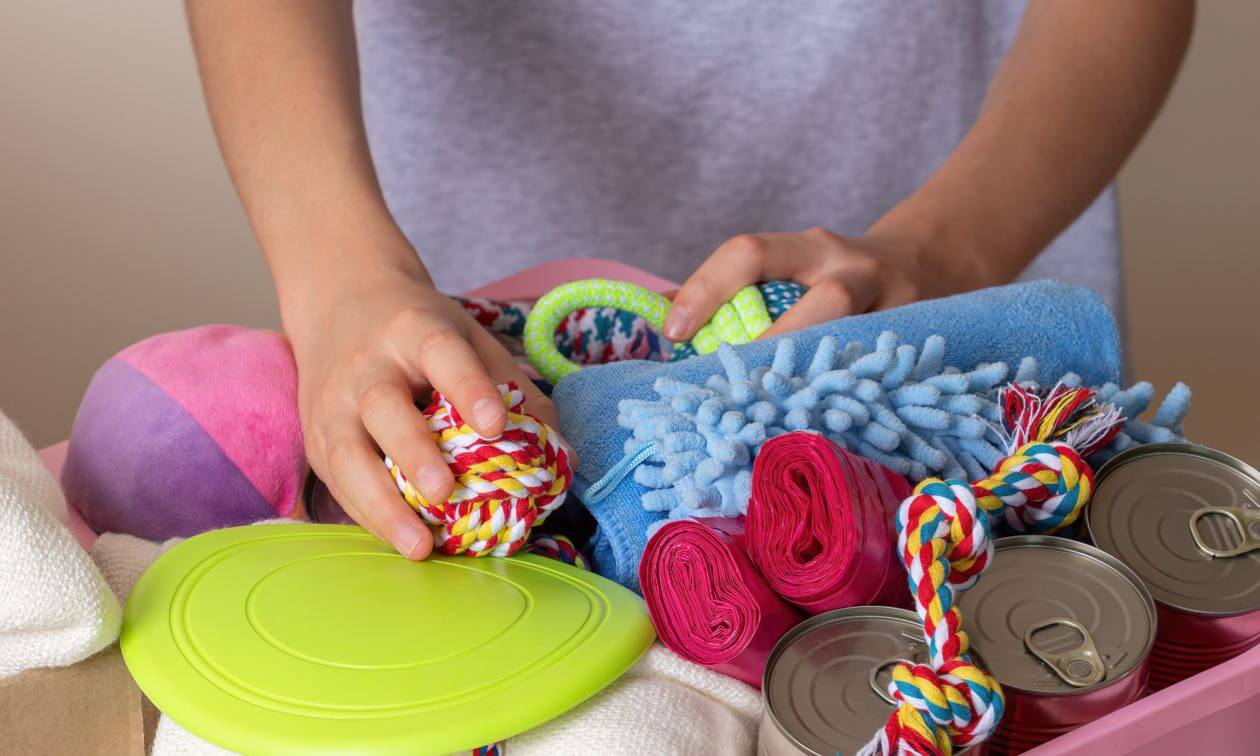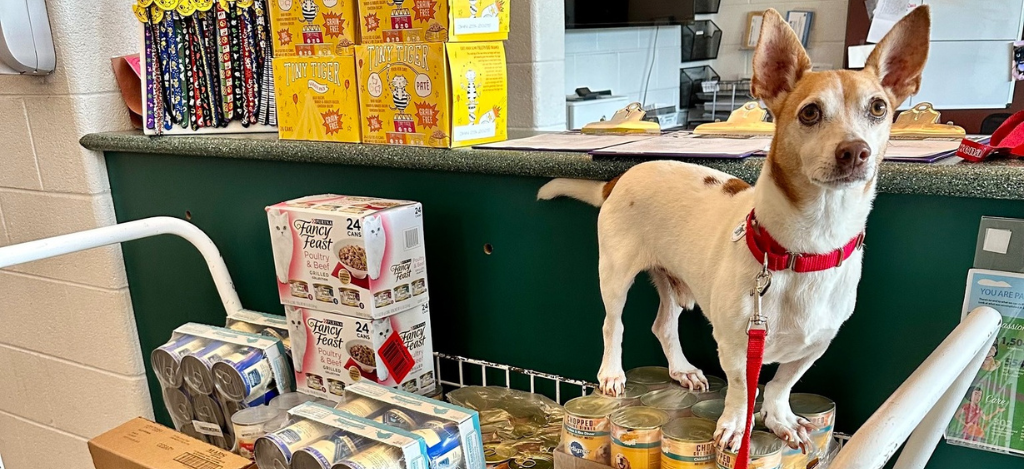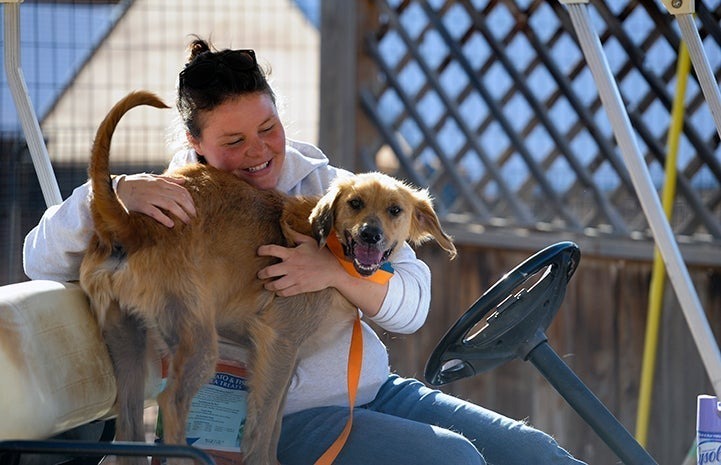Animal shelters and rescue organizations play a critical role in caring for lost, abandoned, or surrendered pets. While many of these groups operate on tight budgets, public support—especially in the form of donated goods—can make a tremendous impact.
If you’re decluttering your home or cleaning out your pet’s old supplies, it’s worth considering what items you might be able to donate to an animal shelter or rescue. From gently used pet gear to household basics, many of the items you no longer need can help improve the daily lives of animals and support shelter operations.
Before donating, always check with your local shelter to confirm which items they’re currently accepting. Needs can vary by location, season, and available storage space.
1. Pet Supplies, Toys, and Enrichment Items
Animals in shelters benefit immensely from physical and mental stimulation. Donated toys and enrichment items help reduce stress and promote healthier, more adoptable pets. In addition to toys, shelters are often in need of practical pet supplies for daily care.
Here are some pet-related items you might be able to donate:
- Gently used toys – Ensure they’re durable, clean, and free of small, loose parts.
- Collars, leashes, and harnesses – Especially in various sizes to accommodate all breeds.
- Crates, kennels, and exercise pens – These provide safe spaces for animals in transport or recovery.
- Food and water bowls – Stainless steel or BPA-free plastic options are preferred.
- Pet grooming tools – Brushes, nail clippers, ear wipes, and shampoo (pet-safe and fragrance-free).
- Unopened, unexpired food or treats – Dry kibble, canned food, or even prescription diets.
- Potty training supplies – Puppy pads, litter boxes, litter scoops, and unused cat litter.
- Preventive care products – Sealed and unexpired flea, tick, or heartworm medications (if accepted).
By donating these items, you’re helping to meet the basic care needs of animals while reducing the shelter’s expenses. Always clean items before donating and ensure food or medical products are sealed and within their expiration date.

2. Towels, Blankets, and Bedding
One of the most appreciated donations at animal shelters is soft bedding. Blankets and towels offer warmth, comfort, and a sense of security for shelter animals—especially those recovering from surgery or dealing with anxiety.
Consider donating:
- Old bath towels – Useful for drying animals or cleaning up messes.
- Fleece or cotton blankets – Avoid weighted or heavily knit materials that animals may chew.
- Pet beds and crate liners – New or gently used, if clean and free of damage.
- Old T-shirts or sweatshirts – These can be used as makeshift bedding or comforting items for animals needing extra care.
- Cleaning rags or cut-up fabrics – Ideal for daily cleaning tasks or bedding for smaller animals.
If you’re unsure whether a particular item is suitable, reach out to your local shelter first. These items may not be ideal for donation to a thrift store, but they can offer tremendous value to animals in temporary housing.

3. Cleaning and Sanitation Supplies
Maintaining cleanliness in an animal shelter is essential for the health and safety of both animals and staff. Donated cleaning supplies help ensure shelters can maintain a sanitary environment without exceeding tight budgets.
Items you might be able to donate include:
- Bleach and disinfectants – Effective in maintaining cleanliness and controlling disease.
- Paper towels and tissues – High-consumption items used for daily cleaning.
- Laundry detergent (fragrance-free) – Used for washing pet bedding and towels.
- Dish soap – Useful for washing food bowls and grooming tools.
- Trash bags and liners – Heavy-duty bags are especially appreciated.
- Scrub brushes, buckets, mops, and brooms – If in good condition and clean.
- Disposable gloves and hand sanitizer – For hygiene during feeding, cleaning, or medical care.
Many shelters will post a “high-need” list of cleaning products on their website or social media platforms. Be sure to donate unopened products in usable condition to avoid waste or safety concerns.

4. Office Supplies and General Use Items
Running an animal shelter requires more than just animal care—it also involves administrative tasks, communications, and paperwork. Donated office supplies can help streamline operations and save valuable funds for more direct animal care.
Shelters may accept:
- Pens, markers, and notepads
- Folders, binders, and clipboards
- Envelopes and printer paper
- Filing cabinets and storage bins
- Blank labels or mailing supplies
In addition, many shelters appreciate:
- Old newspapers – Used for lining cages, absorbing spills, or creating temporary litter setups.
- Zip ties and twist ties – Useful for securing items in place.
- Empty prescription bottles (cleaned and label-free) – Can be reused for pet medications or supplements.
Again, always confirm with the shelter before donating office-related or general-purpose supplies. They may also have seasonal needs for specific materials, such as event signage or promotional printing.

Find a Shelter Near You to Donate
When thinking about items you might be able to donate to an animal shelter or rescue, your first step should be to locate a nearby organization. Each shelter may have different needs and donation policies, so contacting them directly is the best way to ensure your contribution is useful.
Here are a few ways to connect:
- Visit the shelter’s official website for updated wish lists.
- Follow local shelters on social media for donation drives or urgent needs.
- Call or email the shelter to ask about current shortages or accepted items.
- Explore local directories or animal welfare networks to discover small rescues in your area.
Examples of organizations you might reach out to include:
- Humane societies
- Municipal animal care and control departments
- Breed-specific rescues
- Foster-based rescue organizations
- No-kill shelters and sanctuaries

Final Thoughts
Decluttering your home can do more than clear your space—it can change the lives of animals waiting for their forever homes. The items you might be able to donate to an animal shelter or rescue—from gently used towels and toys to basic cleaning products and office supplies—can make a direct impact on the well-being of animals and the efficiency of shelter operations.
Before dropping off donations, remember to:
- Clean all items, especially pet supplies.
- Check expiration dates on food or medications.
- Contact the shelter to confirm they’re currently accepting what you’d like to give.
Your thoughtful donation can bring comfort, safety, and joy to animals in need—and it’s a great way to support the compassionate people behind the scenes who care for them every day.















Leave a Reply